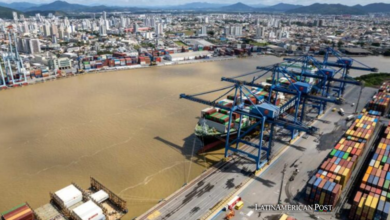Printing cash as a solution to the COVID19 crisis is possible, but risky
Gustavo Petro, a Colombian leftist leader, proposed to issue tickets to counteract the inflation that the COVID-19 pandemic has left in Colombia .

The leftist leader proposed to increase the issuance of banknotes in Colombia. / Photos: IG-gustavopetrourrego, Pixabay
LatinAmerican Post | Christopher Ramírez Hernández
Listen to this article
Leer en español: Imprimir billetes como solución a la crisis de la COVID19 es posible, pero arriesgado
A few weeks ago, the director of the National Statistics Department of Colombia (DIAN), Juan Daniel Oviedo, assured that, in the case of that country, the 2020 Gross Domestic Product would have ended with a decrease of between -7% and the -8.1%.
In this way, according to Oviedo, the strict quarantines, established in response to the crisis generated by the COVID-19 pandemic, would have negative effects for the Colombian economy, especially on the monetary value of the country's total production.
In summary, when the production of goods and services was reduced during 2020, the value of the existing one was reduced by almost 10%, which is represented in the increase in prices and therefore in the increase in inflation in Colombia. With less supply and greater demand, prices go up and the value of money goes down.
Mi querido amigo Fernán, todos los años eL Banco de la República emite billetes, el año pasado 40 billones. ¿Eso le parece desvirulado?
¿O lo desvirulado es que esa emisión fuese a la renta básica y el subsidio a la pequeña y mediana empresa y no a Luis Carlos Sarmiento? https://t.co/NgzofH7HRW
— Gustavo Petro (@petrogustavo) January 25, 2021
Faced with this reality, the senator of Human Colombia and former candidate for the Presidency of Colombia, Gustavo Petro, gave an idea that has not gone unnoticed among public opinion: to issue banknotes in order to improve the purchasing power of Colombians.
According to Petro, the best way to face the economic crisis in the country is for the Banco de la República to issue a loan to the national government, and for it to be in charge of distributing it equitably among the vulnerable population and the owners of small and medium-sized enterprises (SMEs).
"What I propose […] is that instead of playing that speculative game (issuing money to private banks), those issues that were already made in Colombia, 40 billion pesos last year, go first, via the The state, through a loan, towards small and medium-sized enterprises to support most of the employment, "explained the leftist leader in an interview with Blu Radio.
The quantity theory of money
For Petro, the growth of prices in the Colombian economy, that is, the inflation left by the coronavirus crisis can be counteracted with the printing of money whose sole destination is the transit of these new bills to the interior of the town, with the help of SMEs.
This idea stems from what, according to the Congressman, is basic in the study of economics and is what is known as the quantity theory of money (TDC) , which explains that the growth in prices can be balanced with a greater issuance of money by the central bank of a country.
Also read: What is short selling and why is it such a controversial move?
Now, how feasible is it to base your initiative on this economic theory?
To begin with, it is necessary to clarify the variables of the TDC and the way in which it could serve as an explanation of inflation in an economy.
According to the economist Irving Fisher, who, in his book The Purchasing Power of Money, shaped the equation with which this theory is studied to know the real value of money in a society, it is necessary, as Petro explained it well on Blu Radio : “(Multiply) the money supply by its speed”, which would be “equal to the price level for the transactions”.
In economic terms, the operation to be carried out would be: M * V = P * Y , in which M is the money supply (amount of money that passes through); V is the speed with which that money moves within a territory; P is the price level, as well as Y the level of production or number of transactions.
In an easy way, according to the theory and the form proposed by Fisher, both the speed of money and the level of production are exogenous variables, that is, constant terms in the economy due to their stability in the short term.
Thus, if we take these variables out of the table, what we are left with is M = P, which, translated in simple terms, would explain that the money supply is directly proportional to the increase in prices, or vice versa.
“This means that if I increase the money supply, there may be an increase in the price level or the level of transactions. And the transactions are the reflection of a real economy, of production if we are talking about capitalism, "Petro explained in the Colombian station.
Now, Fisher himself explains that, although this strategy may work in a short period of time, if it is maintained, it could have serious consequences in the future, based on the inherent changes in the level of production in the medium and short term.
Bringing it to the reality generated by COVID-19, the increase in the issuance of money may result in a viable strategy for 2021 since the increase in prices would be offset by a greater transit of currency in the country. However, by 2022 that injection of money may be counterproductive if, at the beginning of next year, the level of production does not establish a growth similar to that of the issuance granted by the Banco de la República.
In short, more money in transit and less production (which is logical in the midst of unemployment and the closure of private companies), equals higher costs and lower purchasing power, therefore, more inflation; which would require a new credit to the Government, thus increasing, year after year, the public debt in the country.
In summary, and according to Jorge Restrepo, associate professor of Economics at the Javeriana University, in conversation with Valora Analitik, in the medium term "issuing […] would extraordinarily increase the cost of public and private credit and would unbalance the economy" of Colombia.




